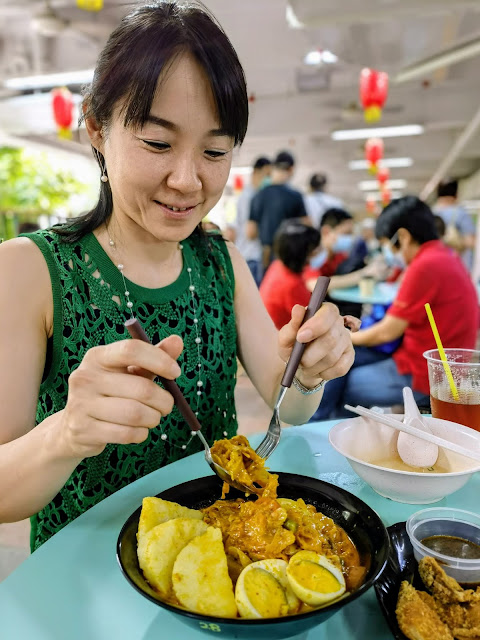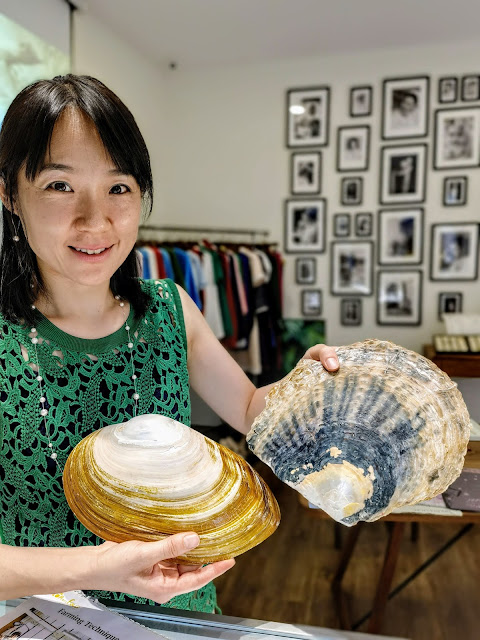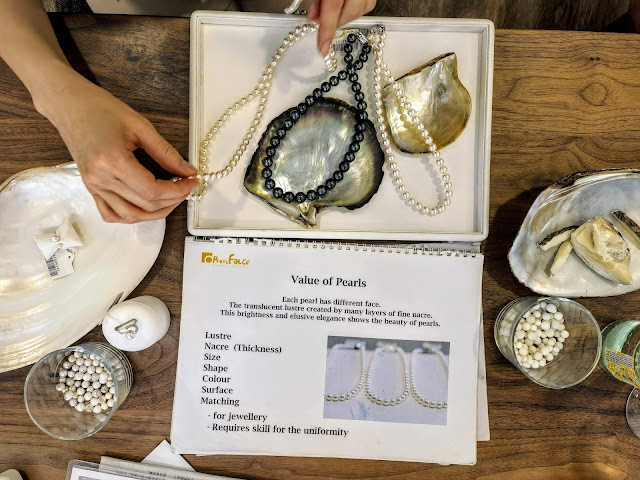Today, I learned about pearls from Ms Maiko Makito, heir and owner of Pearl Falco from Ise Shima in Japan.
Pearl Falco is based in Ise Shima in Japan. Ms Maiko runs the gallery and retail shop at Mohamed Sultan Road in Singapore, Pearl Falco's only overseas outpost. From Singapore, Ms Maiko also runs Pearl Falco's operations in Ise Shima, spending at least 10 days every month in Japan (until the Covid-19 pandemic).
 |
| Ms Maiko is a fan of Singapore hawker food |
Ms Maiko first came to Singapore fifteen years (2005) to work in NEC's regional headquarters. Five
years ago (2016), she decided to join the family business founded by her father in
1985. Heading Pearl Falco Ise Shima now, Maiko chose Singapore as the springboard for her venture
overseas.
Maiko's hometown Ise Shima is at the picturesque group of small islands at Japan's pristine Pacific Coast, 5.5 hours drive southwest of Tokyo. The Ise Shima coastline has many jagged shores, islets and sheltered bays which make it ideal for farming pearl oysters.
Ise Shima is the heart of Japan's pearl cultivation industry and where
Mikimoto Kōkichi founder of Mikimoto Pearl Company invented the
technique for culturing pearls in the 1890s.
The technique involves implanting a calcium ball (nucleus) into the oyster. Over the next one to two years, the oyster coats the calcium ball with thousands of layers of nacre which give the pearl its coveted lustre.
During these one to two years, half the oysters will die, less than 30% produce pearls suitable for jewelry use and only 5% yield top grade pearls.
As a food lover, I naturally asked Maiko whether pearl oysters can be eaten (after extracting the pearl). Maiko said oyster flesh is made into fish feed but the abductor muscle is a delicacy in Ise Shima cuisine 😋 Oyster abductor sashimi is crunchy and tastes sweet.
Before Mikimoto-san invented cultured pearls, all pearls were
naturally produced by oysters mostly in the Persian Gulf, Red Sea, the coasts of
India and Sri Lanka.
Today, almost all pearls are cultured in Ise Shima, Japan and in
China.
In China, the pearls are produced by freshwater clams (left) while in Ise Shima, pearls are produced by seawater Akoya oysters. Today, only 5% of pearls are from seawater oysters while 95% are from freshwater clams.
Freshwater pearls can be produced within six months compared to one to two years for seawater Akoya pearls. Up to 30 calcium balls can be implanted into a large freshwater clam but only one calcium ball is implanted into each Akoya sea oyster.
Hence, freshwater pearls are less dense, less
resistant to corrosive chemicals (sweat, perfume, etc), so they don't keep their shine as long as
their seawater cousins.
Maiko showed us what to look out for in pearls - lustre, nacre, size, colour, surface, and match (e.g. uniformity in a pair of ear rings or pearl necklace).
Maiko also showed us how to differentiate genuine (left) and fake pearls (right) by their material, surface, weight, colour, etc, but it is not easy for an untrained person.
Valuing pearls requires a lot of expertise that can only come with years of experience and good judgement. Get your pearls only from knowledgeable, trustworthy sources.
If you are a pearl enthusiast or keen to learn about pearls, you can visit Falco Pearl gallery and retail shop by making an appointment with Maiko Makito ☎ +65 6610 2967 📧 makito@p-falco.com ⚪
Falcon Pearl has a wide range of hand crafted pearl jewelry ranging from just hundreds to over ten thousand dollars a piece. You can also discuss with Maiko about custom designed pearl jewelry crafted according to your own specification ⚪
Falco Pearl
Address: 33 Mohamed Sultan Road, #02-03, Singapore 238977
By appointment only with Maiko Makito ☎ +65 6610 2967
Written by Tony Boey on 14 Mar 2021
References:
Image of Cleopatra courtesy of
Wikipedia
Image of pearl extraction courtesy of
Wikipedia
Image of Ise Grand Shrine courtesy of Wikipedia
Image oyster divers courtesy of Wikipedia













This comment has been removed by a blog administrator.
ReplyDelete